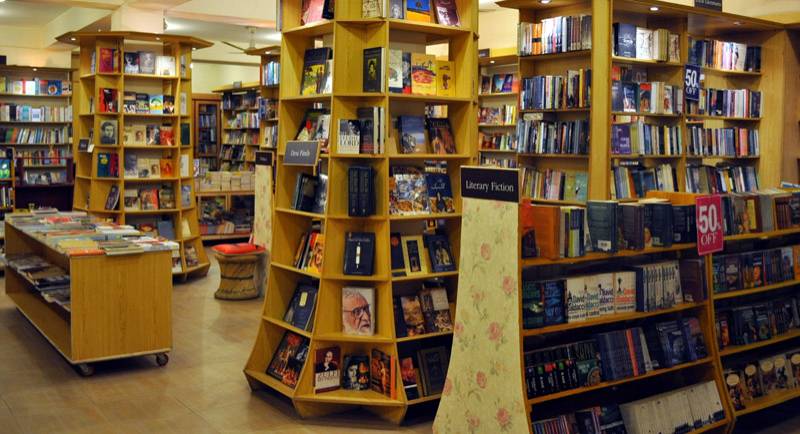
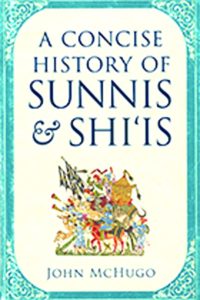
A Concise History of Sunnis and Shi’is
John McHugo
Georgetown University Press (2018)
Rs995
The 1,400-year-old schism between Sunnis and Shi’is is currently reflected in the destructive struggle for hegemony between Saudi Arabia and Iran—with no apparent end in sight. But how did this conflict begin, and why is it now the focus of so much attention?
Charting the history of Islam from the death of the Prophet Muhammad to the present day, John McHugo describes the conflicts that raged over the succession to the Prophet, how Sunnism and Shi’ism evolved as different sects during the Abbasid caliphate, and how the rivalry between the Sunni Ottomans and Shi’i Safavids ensured that the split would continue into the modern age. In recent decades, this centuries-old divide has acquired a new toxicity that has resulted in violence across the Arab world and other Muslim countries.
Definitive, insightful, and accessible, A Concise History of Sunnis and Shi’is is an essential guide to understanding the genesis, development, and manipulation of the schism that for far too many people has come to define Islam and the Muslim world.
John McHugo is an honorary senior fellow at the Centre for Syrian Studies at the University of St. Andrews. He is the author of Syria: A Recent History and A Concise History of the Arabs.
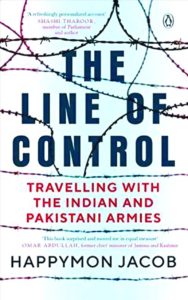
The Line of Control: Travelling with the Indian and Pakistani Armies
Happymon Jacob
Penguin Viking (2018)
Rs995
Happymon Jacob was given the unique opportunity to see the border between India and Pakistan from both sides. He travelled with the armies of both countries and could study what is effectively the ground zero-the location where entrenched animosities as well as sudden surges of comradeship are enacted. This is one of the most fortified places on the planet.
Jacob writes, ‘I was keen on getting into their world, the world of men in uniform, fighting each other and yet respecting each other. It was a curious world. It had breath-taking adventure, mind blowing stories and unforgettable heroism. I loved it, and I was welcome.’
This vividly told, fast paced narrative brings the border area to life. Jacob was given unprecedented access by the Indian and Pakistani armies and he explores how the border is seen-both in the popular imagination and by those who exist in its shadow. He chronicles the lives of civilians and soldiers, their courage and resilience in the face of constant danger and the extraordinary similarities between the two sides.
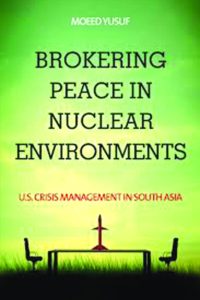
Brokering Peace in Nuclear Environments: U.S. Crisis Management in South Asia
Moeed Yusuf
Stanford University Press (2018)
Rs7,595
One of the gravest issues facing the global community today is the threat of nuclear war. As a growing number of nations gain nuclear capabilities, the odds of nuclear conflict increase. Yet nuclear deterrence strategies remain rooted in Cold War models that do not take into account regional conflict. Brokering Peace in Nuclear Environments offers an innovative theory of brokered bargaining to better understand and solve regional crises. As the world has moved away from the binational relationships that defined Cold War conflict while nuclear weapons have continued to proliferate, new types of nuclear threats have arisen. Moeed Yusuf proposes a unique approach to deterrence that takes these changing factors into account.
Drawing on the history of conflict between India and Pakistan, Yusuf describes the potential for third-party intervention to avert nuclear war. This book lays out the ways regional powers behave and maneuver in response to the pressures of strong global powers. Moving beyond debates surrounding the widely accepted rational deterrence model, Yusuf offers an original perspective rooted in thoughtful analysis of recent regional nuclear conflicts. With depth and insight, Brokering Peace in Nuclear Environments urges the international community to rethink its approach to nuclear deterrence.
Moeed Yusuf, PhD, is Associate Vice President of the Asia center at the U.S. Institute of Peace. He is the editor ofPakistan’s Counterterrorism Challenge and Insurgency and Counterinsurgency in South Asia and co-editor of South Asia 2060 and Getting it Right in Afghanistan.
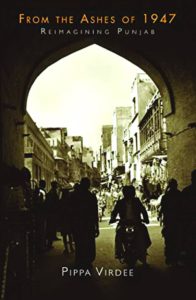
From the Ashes of 1947
Pippa Virdee
Cambridge University Press (2018)
Rs1,795
This book revisits the partition of the British Indian province of Punjab, its attendant violence and, as a consequence, the divided and dislocated Punjabi lives. Navigating nostalgia and trauma, dreams and laments, identity(s) and homeland(s), it explores the partition of the very idea of Punjabiyat. It was Punjab (along with Bengal) that was divided to create the new nations of India and Pakistan. In subsequent years, religious and linguistic sub-divisions followed - arguably, no other region of the sub-continent has had its linguistic and ethnic history submerged within respective national and religious identity(s). None paid the price of partition like the pluralistic, pre-partition Punjab. This work analyses the dissonance, distortion and dilution witnessed by Punjab and presents a detailed narrative of its past.
Pippa Virdee teaches Modern South Asian History at De Montfort University, Leicester. She has been a visiting fellow at the Centre for Governance and Policy (ITU), Lahore. She is the author of Coming to Coventry: Stories from the South Asian Pioneers (2006) and has co-edited Refugees and the End of Empire (2011). Her academic interests include British colonial history, the history of Punjab and partition studies.
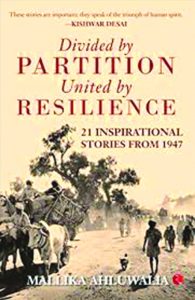
Divided by Partition: United by Resilience: 21 Inspirational Stories from 1947
Mallika Ahluwalia
Rupa Publications India (2018)
Rs595
During the mayhem of the 1947 Partition, lakhs of people lost their homes and livelihoods, while lakhs died. It was a time of catastrophic loss. Despite this, people found the strength to look towards the future and focused on rebuilding their lives and the country they had migrated to. This book captures stories of resilience and sheer grit of people caught in the vortex.
It comprises life stories of twenty-one extraordinary individuals who were deeply affected by the Partition, yet went on to achieve greatness in Independent India. Through their first-hand accounts, they provide a visceral insight into the devastation of families who endured the migration, the camps, and the struggle of rebuilding their lives.
Each of these stories is inspirational in a timeless way, and the book is ultimately about the resilience and triumph of the human spirit over everything else.
Mallika Ahluwalia is the CEO, curator, and co-founder of the world’s first Partition Museum, which opened at Town Hall, Amritsar in August 2017. The museum has been listed in the ‘Best of India: 18 Places to Visit in 2018’ list by National Geographic Traveller India. She was recently awarded with an Excellence Award by Conde Nast Traveller and an ASEAN-India Youth Achiever Award for her work in honouring this history. Prior to this, Mallika worked in the field of health and education with some of the leading international development organizations, focusing on social policy that impacted the most marginalized households in India. She holds an MBA from Harvard Business School, an MPA/ID from Harvard Kennedy School and an A.B. cum laude from Princeton University in public policy. She lives in New Delhi. Three of her four grandparents were affected by the Partition.

